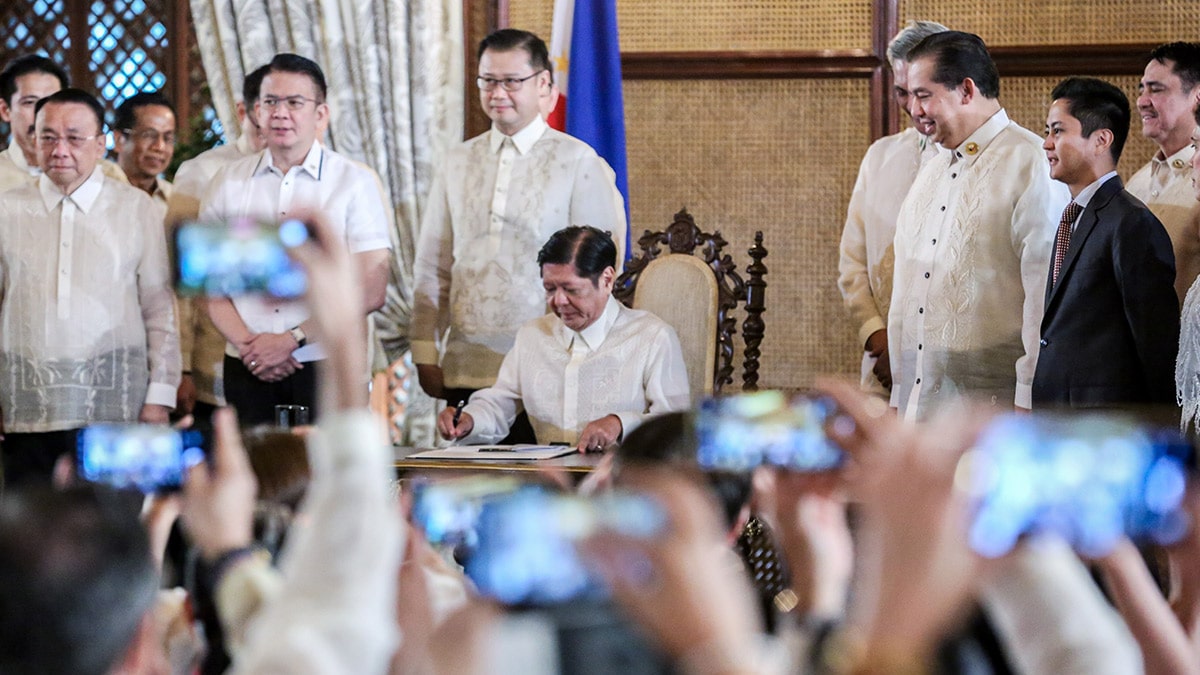
ATTRACTING INVESTORS The Corporate Recovery and Tax Incentives for Enterprises to Maximize Opportunities for Reinvigorating the Economy (Create More) Act, which President Marcos signed on Monday, is expected to attract investments and generate more jobs as it improves the country’s tax incentive policy. —PPA POOL
MANILA, Philippines — President Marcos signed on Monday Republic Act No. 12066, or the Corporate Recovery and Tax Incentives for Enterprises to Maximize Opportunities for Reinvigorating the Economy (Create More) Act, to help make the Philippines a “destination of choice for investments.”
In his speech at the signing ceremony in Malacañang, the President said the Create More Act is “a symbol of the invaluable insights” he had gathered from international partners during his previous trips abroad.
“Their feedback has enriched this legislation, a reflection of our resolve to foster a climate where businesses will flourish and continue to meaningfully contribute to the Philippine economy,” he noted.
READ: Romualdez, Salceda: ‘Create More’ to keep investors in PH, launch jobs
RA 12066 amends the 1997 National Internal Revenue Code and clarifies vague provisions in RA 11534, the original Create Act that was crafted to help enterprises recover from the impact of the pandemic by lowering the corporate income tax rates and rationalizing fiscal incentives.
While the Create Act focused on tax incentives and corporate tax reduction, Create More enhances the ease of doing business in the country as it clarifies value-added tax (VAT) rules, provides more attractive tax incentives, strengthens governance and accountability, and makes clear transitory rules for eligible local and foreign firms referred to under the law as registered business enterprises (RBEs).
Sen. Juan Miguel Zubiri, the author and cosponsor of RA 12066, said that many foreign companies had complained about the “protracted process” of applying for VAT refunds.
“Create More will certainly fast-track the entry of more foreign investors into the Philippines. This will help facilitate more partnerships and joint ventures with our local companies,” Finance Secretary Ralph Recto said.
The new law provides a more competitive and generous incentive package for strategic and highly desirable investments.
For instance, RBEs will have the option to choose between the special corporate income tax (SCIT) of 5 percent or the enhanced deductions regime (EDR) right from the start of their commercial operations.
The SCIT and EDR incentives, previously capped at a maximum of 10 years, are now extended to a period of up to 17 or 27 years, respectively, to attract strategic and high-quality investments.
Labor-intensive projects will also be allowed to apply for an extension of another five or 10 years.
Efficient process
The corporate income tax rate of RBEs will be reduced to 20 percent from 25 percent, while the deductions in power expenses of RBEs will be raised to 200 percent from 100 percent.
The VAT refund process is further streamlined by limiting the documentary requirements and speeding up the processing of refund claims.
The new law establishes a more efficient approval process by raising the investment capital threshold for investment promotion agencies such as the Philippine Export Zone Authority and the Board of Investments from P1 billion to P15 billion, allowing only projects exceeding this amount to be reviewed by the Fiscal Incentives Review Board.
It likewise simplifies local taxation by imposing a local tax of up to 2 percent of gross sales on RBEs in lieu of all other local taxes, fees and charges.
Tax exemption
Companies eligible for this tax rate will then be exempt from all other local taxes, including franchise and amusement taxes; regulatory, building, inspection, or permit fees and charges imposed by provinces, cities, and municipalities, as well as barangay taxes, fees, charges, and fines.
The law institutionalizes the adoption of flexible work arrangements as a business model for RBEs operating inside economic zones and free ports and will be allowed to implement work-from-home arrangements for up to 50 percent of their employees.
Optimism
The Joint Foreign Chamber of the Philippines cheered the signing of the new law, signaling optimism from foreign enterprises pushing for the key tax reform measure.
Peza Director General Tereso Panga called the measure a pivotal law that strengthens their ability to attract foreign investments and positions the Philippines as a competitive destination for export-driven industries.
“The passage of Create More has triggered so much interest from foreign and domestic direct investors, especially the large-scale ones. This is our main tool to make the Philippines an attractive investment destination,” said Secretary Frederick Go, who heads the Office of the Special Assistant to the President for Investment and Economic Affairs.
Speaker Martin Romualdez said RA 12066 resolved confusion and ambiguities arising from tax incentives granted under the original Create Act and hoped that “the changes will satisfy our existing investors and entice more foreign capitalists to invest in the country.”
Senators also hailed the enactment of the law and expressed confidence that it would help create more jobs for Filipinos by enticing new foreign investors. —with reports from Alden M. Monzon, Marlon Ramos, and Jeannette I. Andrade

